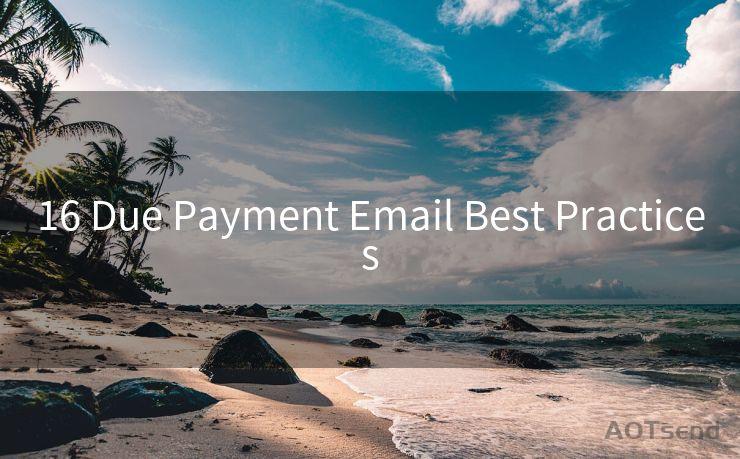16 Due Payment Email Best Practices




When it comes to payment reminders, the tone, clarity, and professionalism of your email can make or break customer relationships. Here are 16 best practices for crafting due payment emails that are both effective and respectful.
1. Clear Subject Line
🔔🔔🔔
【AOTsend Email API】:AOTsend is a Managed Email Service for sending transactional emails. Support Email Types: reminders, authentication, confirmations, notifications, verification codes, invoices, password resets, account activations, billing statements, two-factor authentication (2FA), and one-time passwords (OTP) emails, etc. $0.28 per 1000 Emails. 99% Delivery, 98% Inbox Rate.
You might be interested in:
Why did we start the AOTsend project, Brand Story?
What is a Managed Email API, How it Works?
Best 25+ Email Marketing Platforms (Authority,Keywords&Traffic Comparison)
Best 24+ Email Marketing Service (Price, Pros&Cons Comparison)
Email APIs vs SMTP: How they Works, Any Difference?
Start with a clear and direct subject line that immediately conveys the purpose of the email, such as "Reminder: Payment Due for [Service/Product]". This helps the recipient understand the email's urgency.
2. Professional Greeting
Always open with a professional greeting, using the customer's name if possible. This personal touch establishes a polite and respectful tone.
3. State the Purpose
Quickly and clearly state the purpose of the email: to remind about an overdue payment. Avoid ambiguity or beating around the bush.
4. Provide Details
Include specific details about the overdue payment, such as the invoice number, date of the invoice, and the total amount due.
5. Use a Friendly Tone
Maintain a friendly and understanding tone in your email. Avoid sounding accusatory or aggressive, as this can damage customer relationships.
6. Offer Payment Options
Make it easy for customers to pay by providing multiple payment options and clear instructions on how to make the payment.
7. Include a Deadline

Specify a clear deadline for payment, along with any potential consequences of missing that deadline, such as late fees or service interruption.
8. Attach Relevant Documents
If possible, attach a copy of the invoice or other relevant documents to the email for easy reference.
9. Avoid Excessive Formality
While professionalism is key, avoid overly formal language that might alienate your readers. Stick to a conversational yet respectful tone.
10. Thank the Customer
Thank the customer for their attention and cooperation, even in a payment reminder email. This shows appreciation and maintains positivity.
11. Provide Contact Information
Include your contact information or a link to customer support in case the customer has any questions or needs assistance.
12. Use Templates Wisely
While templates can save time, customize them enough to ensure they don't sound impersonal or robotic.
13. Proofread and Edit
Always proofread your email for grammar and spelling errors. Professionalism in communication is crucial.
14. Follow Up Appropriately
If no response is received, consider sending a follow-up email after a reasonable period, maintaining the same professional and friendly tone.
15. Consider Timing
Be mindful of when you send payment reminder emails. Avoid sending them at inconvenient times, like early mornings or late nights.
16. Test and Optimize
Regularly test and optimize your email communication based on customer feedback and response rates to ensure maximum effectiveness.
By following these best practices, you can craft due payment emails that are both effective and respectful, maintaining positive customer relationships while ensuring timely payments.




Scan the QR code to access on your mobile device.
Copyright notice: This article is published by AotSend. Reproduction requires attribution.
Article Link:https://www.mailwot.com/p5867.html



